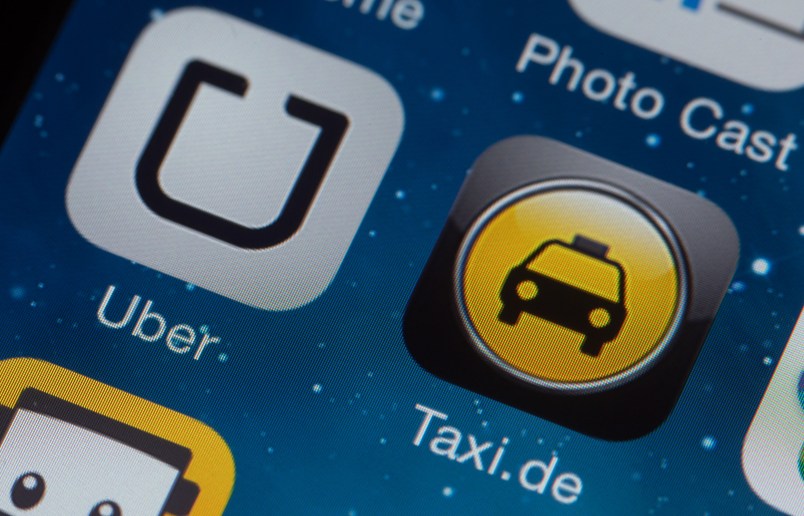SAN FRANCISCO (AP) — Uber has agreed to pay up to $100 million and make several policy concessions to settle a pair of major class-action lawsuits in two states that will keep its drivers independent contractors instead of employees, both sides announced Thursday night.
The settlement is a major step toward the ride-hailing company keeping its thriving business model that has been threatened as drivers have sought a more secure status and more bargaining rights.
Under the deal, Uber will pay $84 million to the plaintiffs in California and Massachusetts and another $16 million if the company goes public and meets certain goals.
In a concession touted by the plaintiffs, Uber will allow drivers to put signs in their cars saying “tips are not included” in the price of a ride and would be appreciated. Lyft, a rival ride-hailing service, allows for riders to add a tip for the driver on the app, Uber does not.
San Francisco-based Uber also agreed to improve its systems for communicating with drivers about their ratings and why they are terminated, to allow arbitration in disputes with drivers, and to help start drivers’ associations in both states.
In the past, Uber could deactivate drivers without explanation. Now the company must give cause for deactivation, and certain standards like drivers’ accepting too few passengers are no longer consider grounds for being cut off by the company.
“We believe these to be very significant changes that will improve work conditions for Uber drivers,” plaintiffs’ attorney Shannon Liss-Riordan said in a statement on the deal.
Uber CEO Travis Kalanick said in a blog post announcing the deal that “we haven’t always done a good job working with drivers,” especially on the issues of deactivation and appeal.
He said with more than 450,000 drivers now working for the company, “it’s time to change.”
The deal settles the two largest lawsuits Uber faced, counted by the number of drivers involved. It still faces similar suits in several other states including Arizona and Florida.
Classifying its workers as employees could have raised Uber’s operating expenses significantly and would go against its business model and identity. Uber’s selling points for drivers are based on ideas of freedom and autonomy.
“Drivers value their independence — the freedom to push a button rather than punch a clock, to use Uber and Lyft simultaneously, to drive most of the week or for just a few hours,” Kalanick said in his statement.
Federal law does not extend collective bargaining rights to independent contractors such as architects, masseuses or workers dispatched through mobile applications such as Uber and Lyft.
The settlement, which involved about 385,000 drivers in in the two cases, was filed in a U.S. District Court in San Francisco.
After the initial $84 million, Uber will pay out the other $16 million if the company goes public and the average valuation increases to 1 ½ times its previous financing round.
Liss-Riordan acknowledged that some will be disappointed that the case will not go to trial in June as planned, and that attorneys had to balance the gains offered against the chance of losing.
“If we had not settled, there were some serious risks that all we have fought for — and have achieved — could be taken away,” Riordan-Liss said in her statement.
One of the main risks she cited was that a jury in San Francisco, where Uber is heavily used and extremely popular, could side with the company instead of the drivers.
U.S. District Court Judge Edward Chen must still sign off on the deal.
Chen had dealt the company a blow last year when he granted class-action status to the California drivers, rejecting Uber’s argument that most of its drivers preferred their contractual status and therefore Uber drivers should not be considered a class.
He rejected that drivers should be able to sue the company for expenses in addition to tips, however.
Uber also still faces risks that legislators and labor regulators will change employees’ status.
Hours before Thursday night’s announcement, a California assemblywoman withdrew a longshot proposal that would have allowed Uber drivers and all other independent contractors in California to unionize.
Assemblywoman Lorena Gonazalez (D-San Diego) said she’ll make changes to her proposed legislation before trying it again next year.
Copyright 2016 The Associated Press. All rights reserved. This material may not be published, broadcast, rewritten or redistributed.







I’ve never Ubered but I am a contractor. I’ve also been in the union and liked it.
I’m not sure what ‘freedom’ drivers would lose by gaining collective bargaining? The freedom to have more security and better benefits I guess.
Are these drivers contractors or employees? If they’re the latter, how do they suddenly become the former when money changes hands?
It’s a legal issue, isn’t it?
This may have been less of a risk than Riordan-Liss thought. In the UPS strike (over 10 years ago), UPS discovered that the incredible loyalty UPS had from its customers was actually loyalty to that friendly guy who came to their office every day.
What a sellout. Now Uber will continue to undermine American labor laws. The phony independent contractor disease will spread throughout the labor market.
If Uber keeps growing will they at some point become, Uber Uber?